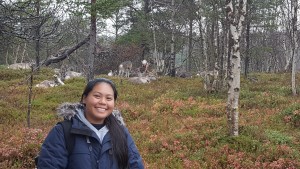Julienne T. Bonoan
MSc. Student
Contact Information
Department of Biology
Concordia University (Loyola Campus)
7141 Sherbrooke St. W. H4B 1R6
Montreal, QC, Canada
Office: SP301.16
Lab: SP434
(514) 848-2424 (ext. 4021)
jette_bonoan_@hotmail.com
Education
2018-Present: MSc. Biology at Concordia University, Montreal, QC
2013-2018: BSc. Biology and Chemistry at the University of Toronto, Mississauga, ON
My Project
Understanding the factors that play a role in the social network of a captive herd of Reindeer (Rangifer tarandus) situated at the Kutuharju Field Reindeer Research Station in Kaamanen, Finland.
Background
My project concerns the Social Network Analysis (SNA) of a semi-domesticated herd of reindeer (Rangifer tarandus) situated in Kaamanen, Finland. Analysis of social structures can provide insights into a multitude of processes that occur in the population, such as cooperation and transmission of information. It thus has many practical applications, for example in disease management and in conservation programs. The effects of kinship in the social organization is of particular interest in this project as there have also been many studies proving its importance. Kinship selection theory also predicts that individuals are able to benefit indirectly from kin associations; however, many studies have showcased that females are more likely to benefit from these kin association in comparison to males. Multiple studies have looked at the social structure of animals of different taxa; however, analyzing the social structure of populations exhibiting fission-fusion group dynamics has been particularly challenging. Using long-term data on the behaviour and group dynamics of this population as well as GPS location data, thereby allowing for a more accurate identification and positioning of individuals, this would benefit this study by providing greater detail and precision in association and network data. The use of SNA has also been gaining in popularity due to its advantages and practicality, and modern SNA techniques thus will be used to analyze the social network of this species. This project would thus be of great importance as it will not only be able to analyze the social structure of a species exhibiting fission-fusion group dynamics, but also to exhibit the advantages of utilizing more modern techniques such as GPS collars and SNA.
Field Work
Field work will be conducted at the Kutuharju Field Reindeer Research Station in Kaamanen, Finland (69°N, 27°E), where a semi-domesticated herd of Reindeer (Rangifer tarandus) have been monitored since 1996. Individuals, excluding calves, are identified using collars and mating successes are recorded; therefore, the pedigree of individuals are known. More detailed information on the ecology and behaviour of individual reindeer can be provided by the Finnish Reindeer Herders Association who manages and harvests these animals.
Objectives
The objective of my MSc thesis is to investigate how reindeer socially organize themselves during the rutting period, and to be able to use their social network information in practical situations such as predicting how information and disease could be socially transmitted in the population.
- Determine if reindeers have distinct groups based on a clustering coefficient technique
- Use lagged association rates (LARs) and permutation data to determine if relationships are temporally stable and non-random
- Within mating groups (or harems) formed by dominant males, assess if females associate more with certain individuals
- Assess if kinship (or relatedness) is a significant factor in association and social organization
Publications
- Bonoan, J.T.R., R.B. Weladji, G. Body, Ø Holand, & K. Roed (2020) Female reindeer do not assort based on relatedness and age during the rut, but socialize less as they get older. ABS 2020 Virtual Meeting – The 57th Annual Conference of the Animal Behavior Society, July 28-31, 2020, online (oral presentation).
- Bonoan, J.T.R., R.B. Weladji, G. Body, Ø Holand, & K. Roed (2019) Female reindeer (Rangifer tarandus) do not associate based on their relatedness, but socialise less as they get older. Société Québécoise d’Étude Biologique du Comportement. 1-3 November, 2019, Montréal, Québec, Canada. P. 23 (oral presentation).
- Bonoan, J.T.R., R.B. Weladji, Ø Holand, & K. Roed (2019) Female reindeer (Rangifer tarandus) do not associate based on their relatedness, but socialise less as they get older. Quebec Centre for Biodiversity Sciences Congress, 18-20 December 2019. Concordia University, Montréal, Québec, Canada. (oral presentation).